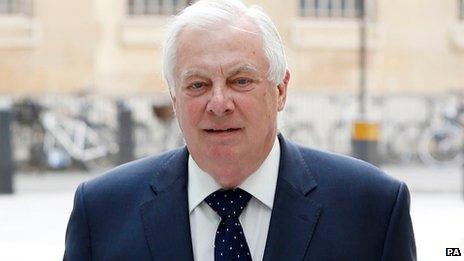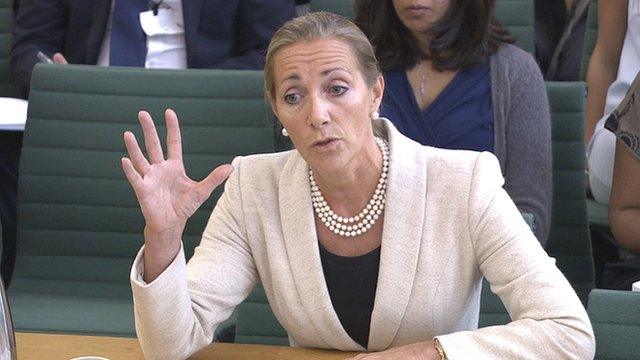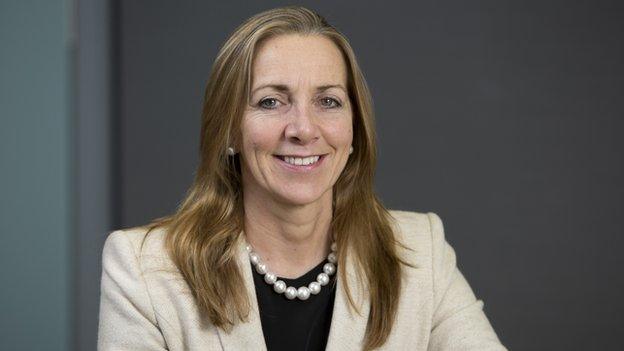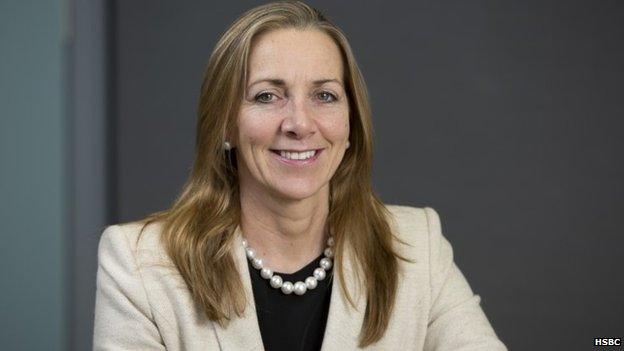BBC Trust candidate Rona Fairhead answers MP questions
- Published
Rona Fairhead said it was a really critical time for the BBC
Rona Fairhead, the preferred candidate to take over from Lord Patten as the new chair of the BBC Trust, has been quizzed by MPs over her appointment.
Mrs Fairhead would be the first woman to hold the position.
She denied claims the government was determined to appoint a woman, telling the Culture, Media and Sport Committee: "I felt the process was, for my mind, a standard process".
She refused to pass judgement on her predecessor's job performance.
Mrs Fairhead - the ex-head of the Financial Times Group - said it was "public knowledge that mistakes were made" but added she had "no intention of saying anything negative".
Lord Patten, who was appointed in 2011, left the job of chairman on health grounds following major heart surgery.
Mrs Fairhead was chairwoman and chief executive of the Financial Times Group between 2006 and 2013 as part of a 12-year career with its owner, Pearson, and is a non-executive director at HSBC and PepsiCo.
When asked what made her qualified to head up the Trust - the body in charge of overseeing the BBC - she said she "woke up and went to bed with the BBC", saying she listened to Radio 4's Today programme and watched the news channel.
She also told MPs she was a fan of Doctor Who as a child and would "wake up early on Sunday to Match of the Day" which she continued to watch with her children.
"I watch across the range of the BBC," she added.
"Dramas - Sherlock is a massive favourite in our family - An Honourable Woman was fantastic. Some members of my family love the British Bake Off, and we all watched Strictly this weekend. "
On the recent scandal surrounding payoffs to senior BBC executives, Mrs Fairhead said the corporation had faced "some legitimate criticisms of the process and the fact the payoffs were not made on contractual terms".
She added it was "a difficult situation in a publicly funded body".
She was also asked about the Jimmy Savile scandal which she agreed had shaken the public's trust in the BBC.

Lord Patten stood down from the post in May
"Public trust for a public broadcaster is at the core," she said.
With the BBC's royal charter renewal due in 2016, Mrs Fairhead was also asked about the future of the licence fee, which she insisted is still the "most appropriate way to fund the BBC".
"This is a significant charter review, we have to look at all the options," she said. "My strong opinion is that there are strong benefits from the licence fee," but added the trust had to be "open to looking at others".
Asked if she felt the BBC offered valued for money, Mrs Fairhead said: "To many, £145.50 is a lot of money, that said if you look at the services the BBC provides, my view is that it is good value for money."
But she added the corporation still had to be "run efficiently and effectively".
- Published9 September 2014

- Published31 August 2014

- Published9 September 2014
